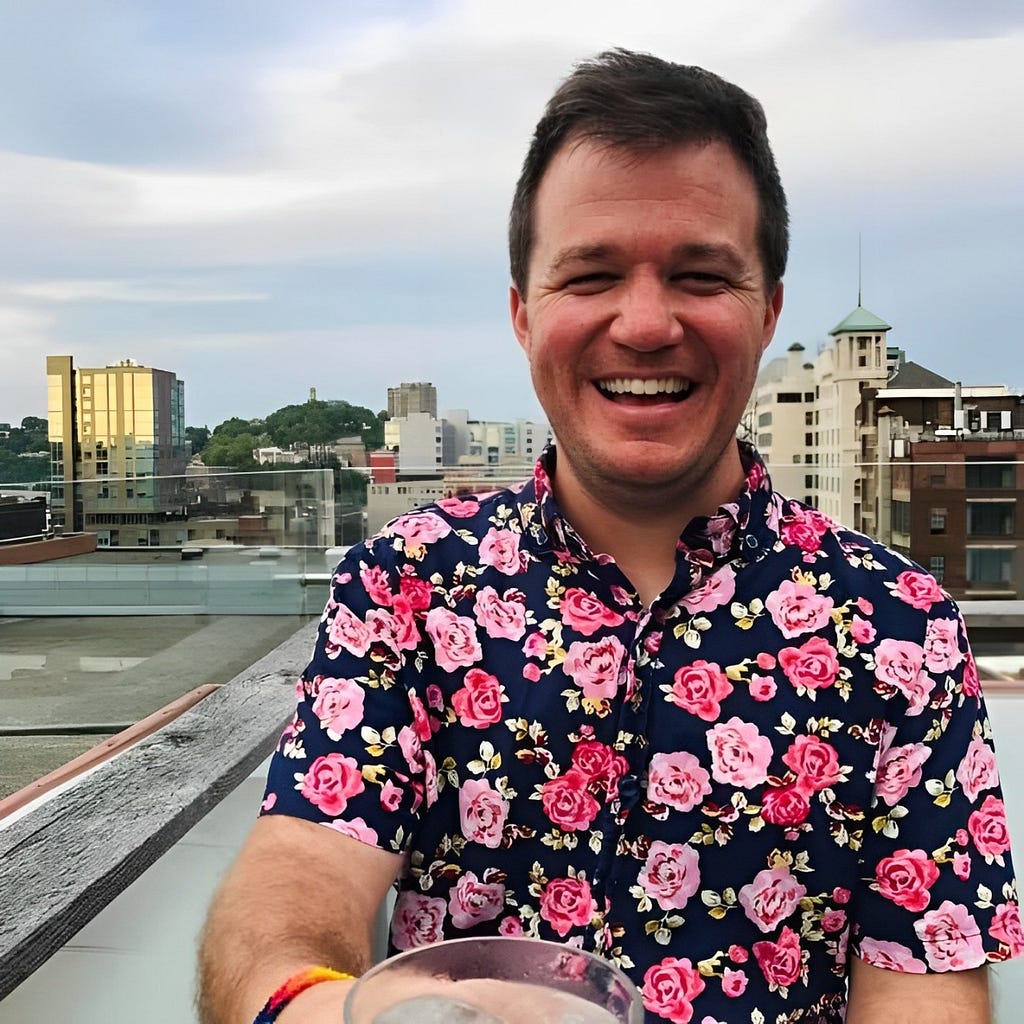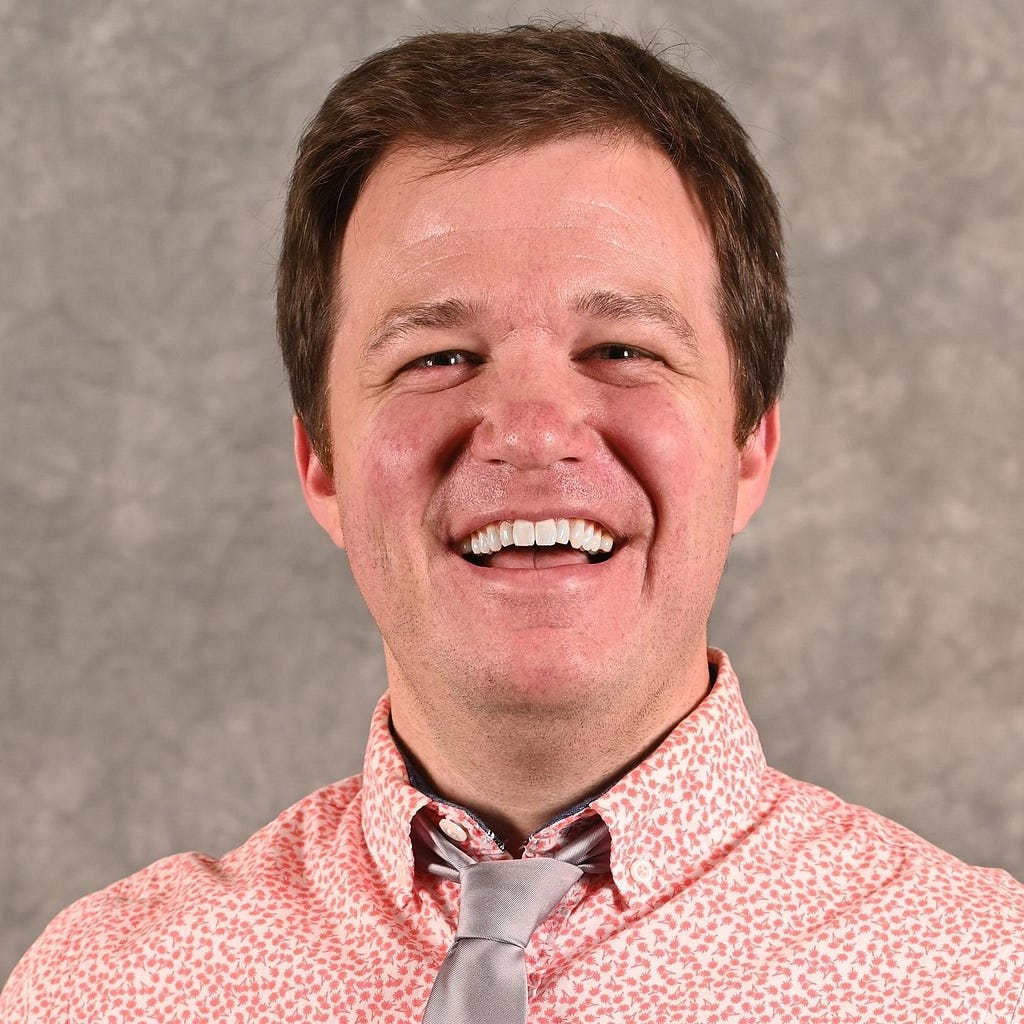This is most important to me when it comes to morale. It is free to be happy, optimistic, to smile. I think it can be hard some days, sure, but I think it’s our duty as leaders to provide this example. That we like where we are, what we’re doing, that we see it is important, and that we want you to feel good being a part of it too.
As part of my series about “authors who are making an important social impact”, I had the pleasure of interviewing Joel Shoemaker.
Author Joel Shoemaker makes for a fascinating interview / media segment. With a deep love of all things literature, he has been a librarian for a decade — and is also a prolific author whose books are unique, intelligent -and unforgettable. His adult titles are the fascinating bacon grief (“a gay affirming faith romantic comedy,” and the unique Teeth & Crumpets: A Florilegium. His latest is the charming children’s book Silas on Sundays. If you hear someone say Shoemaker is magical, you know they aren’t just talking about his epic storytelling abilities- he’s been a professional magician for the last three years! If you ask him to tell you about himself, he’ll tell you that he lives in central Illinois with his husband, “a frog, a colony of cherry shrimp, and his dog, Maximus.” and that he consumes an inordinate amount of cheese.
Thank you so much for joining us in this interview series! Before we dive into the main focus of our interview, our readers would love to “get to know you” a bit better. Can you tell us a bit about your childhood backstory?
When I turned seven years old I was gifted a magic set for my birthday. It wasn’t what I wanted. I don’t remember what I wanted but definitely, definitely not magic tricks. So, it took a few months but eventually boredom got the best of me, I guess, and I opened the magic. Now, thirty-SOME years later, I’m still doing magic. It’s just a hobby, but it really defined my life in a lot of ways. Going through school, somehow, I was sort of, cool (?) maybe. It was my way to fit in. A gateway drug, so to speak, to theatre, which is where I lived in high school, almost literally, shattering a twenty-plus year record of points in my school’s thespian society. A point was equivalent to so many hours of work. I had well over 200 of them if I recall correctly. Anyway, thousands of hours doing high school theatre led me to community theatre and, eventually, to writing my first book, which involves a lot of theatre.
When you were younger, was there a book that you read that inspired you to take action or changed your life? Can you share a story about that?
I really wasn’t a reader until college. This will be an odd answer but it’s true, I read Chuck Palahniuk’s FIGHT CLUB because it was assigned in class and there was going to be a major quiz or something. Anyway, I devoured it followed by all of his work. I don’t really write nearly so dark a subject, of course, but for whatever reason I was really drawn to his style of writing. Later I would meet Chelsea Cain, one of the students in his writing group who would go on to great fame as a thriller and comic book writer. She remains a writing teacher of mine to this day.
It has been said that our mistakes can be our greatest teachers. Can you share a story about the funniest mistake you made when you were first starting? Can you tell us what lesson you learned from that?
Oh, I’m sure I’ve made MANY mistakes. Not so many funny ones. I’ll tell you a funny mistake I made in theatre. In JOSEPH & THE AMAZING TECHNICOLOR DREAMCOAT, I played a brother in a scene that was meant to resemble a, sort of, country line dancing or hoe-down sort of situation. Anyway, I’m a terrible dancer and, though the choreography was astonishingly simple, I found myself in the wrong spot at the wrong time and my friend threw his head up at the right time and in the right place. I just happened to have my face there so when he hit his head into my nose it just started bleeding everywhere. Everything wound up being just fine, so, I promise it’s okay to laugh at it now. But at the time, I just ran offstage because I didn’t know what to do with all of the blood. I had a quick costume change to make, and I just barely made it back onstage in time…the bleeding stopped.
I think the lesson learned here is to be in the right place at the right time. That can matter a lot. And it can save you some bleeding.
Can you describe how you aim to make a significant social impact with your book?
Two of my three books fit are for LGBTQIA+ Christians. The aim is to make people aware that a faith community IS available to them if they want it. No matter who they are. My first book, bacon grief, attempts to do this for tweens and teens which was important for me because I made a conscious choice to become a Christian when I was 14. The great irony of all of this is that people disparage LGBTQIA+ lifestyle “choices” all of the time when that really isn’t the choice at all. Obviously. Indeed, my choice is to align myself with Christianity and I find great comfort in that as well. I’m trying to show that there is a seat at this table for ALL who want it.
Can you share with us the most interesting story that you shared in your book?
I am also a living kidney donor. I had an experience where the donor coordinator insisted on the need to tell my recipient that they were receiving a kidney from a gay person. It was very, very important to her. Which was fine with me because my recipient was my childhood best friend’s mother. So she knew she was getting a gay kidney all along. We laughed about this quite a bit. She’s doing great, by the way, five or six years later. I published this story in The New York Times and expanded it in my short story collection.
What was the “aha moment” or series of events that made you decide to bring your message to the greater world? Can you share a story about that?
I’ve been a librarian for more than ten years now and, with that, an active member of the American Library Association. Through the Rainbow Round Table, a section of the American Library Association that administers LGBTQIA+ literature and non-fiction awards, I was able to participate in some committee work that involved reading. A lot. And what I noticed time and time again was that, if a faith element was involved in the LGBTQIA+ story, it almost always detailed their walking away from the faith. Which is fine as that is a truth in many people’s stories, but it was not my truth. I felt a need for books that highlighted affirming-faith communities which are, gratefully, becoming more and more common.
Without sharing specific names, can you tell us a story about a particular individual who was impacted or helped by your cause?
Yes! I’ll let the person speak in their own words, if that’s OK. This is an excerpt from, I think, the first review I ever received on Goodreads. “I’ve been struggling with my beliefs and identity again recently, and this book, given to me at a school meet and greet I almost didn’t attend, seems very much like a sign from God that I’ll be okay. Thank you, Joel Shoemaker, for that small comfort.”
Are there three things the community/society/politicians can do to help you address the root of the problem you are trying to solve?
There’s really only one that they need to do. Be welcoming. I totally understand disagreements but there’s no reason for the vitriol experienced, especially online. It’s super sad, honestly, and provides a complete misconception to, I believe, what religion should be about. Let’s try being friendly. Let’s try welcoming people in instead of trying to find causes for expulsion.
How do you define “Leadership”? Can you explain what you mean or give an example?
Leadership to me is most effective when provided by example. I like to not be told what to do, but to be shown. This is most important to me when it comes to morale. It is free to be happy, optimistic, to smile. I think it can be hard some days, sure, but I think it’s our duty as leaders to provide this example. That we like where we are, what we’re doing, that we see it is important, and that we want you to feel good being a part of it too.

What are your “5 things I wish someone told me when I first started” and why?
Oh gosh. When I started writing? I think 5 things would be:
- Just write. Don’t dwell on perfection. Make a mess. Tell a story.
- Join writing competitions for motivation.
- Take advice from published people, especially writing what you want to write.
- Meet writers.
- Breathe.
Can you please give us your favorite “Life Lesson Quote”? Can you share how that was relevant to you in your life?
“Writing to me is an advanced and slow form of reading. If you find a book you really want to read but it hasn’t been written yet, then you must write it.” — Toni Morrison, 1981 (according to Book Riot)
This quote is important to so many of us but, again, I just don’t see a lot of fiction that affirms and celebrates both faith and sexuality. So that’s what I have been trying to do with both bacon grief and Silas on Sundays.
Is there a person in the world, or in the US with whom you would like to have a private breakfast or lunch with, and why? He or she might just see this, especially if we tag them. 🙂
David Copperfield. Ultimately, I’ll always be obsessed with magic and magicians and why not wine and dine with the most successful living person in your field. Right? What a dream!
How can our readers further follow your work online?
I’m online at https://itsjoelshoemaker.com and on Instagram @magicianactor
This was very meaningful, thank you so much. We wish you only continued success on your great work!
Social Impact Authors: How & Why Author Joel Shoemaker Is Helping To Change Our World was originally published in Authority Magazine on Medium, where people are continuing the conversation by highlighting and responding to this story.
